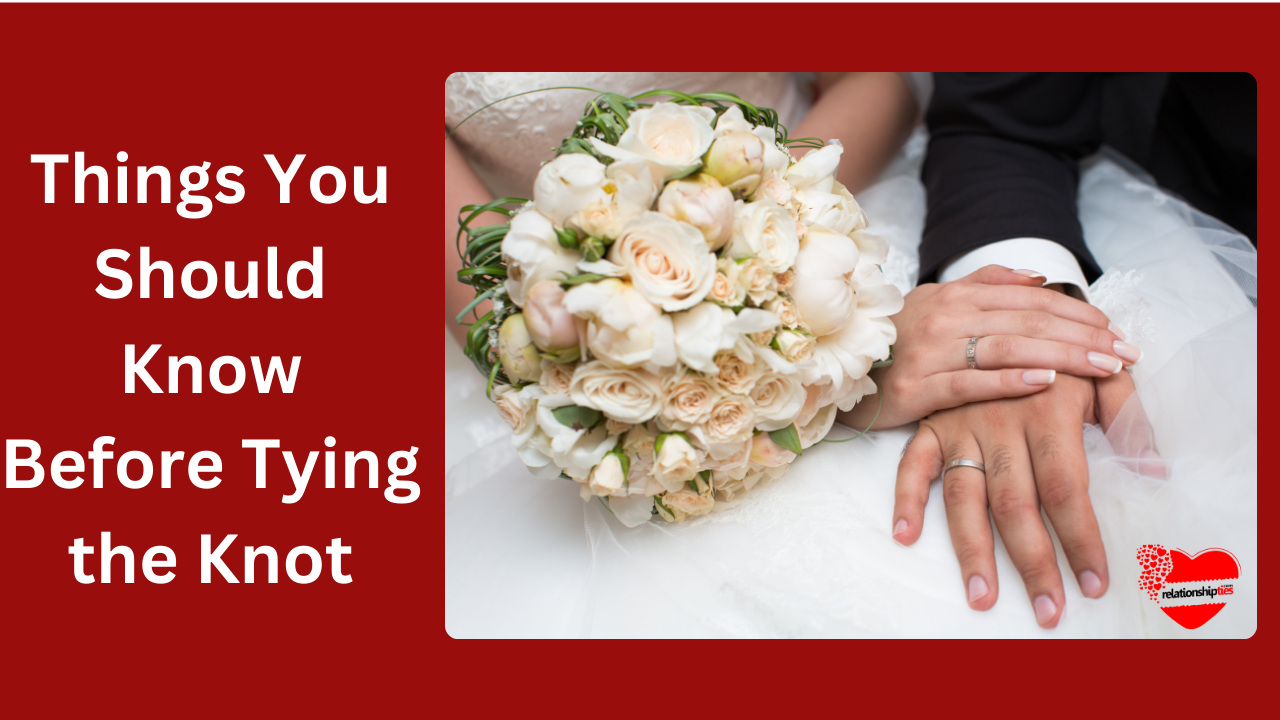It is crucial to understand these 25 things you should know before you tie the knot or say ‘Yes, I Do’. These things can form your non-negotiables in marriage.
Relationshipties.com offers crucial guidance for creating a solid and satisfying connection from trust to communication, financial fit, and shared values.
Learn how to resolve disputes amicably, value one another’s aspirations, and spend meaningful time together.
Learn the value of forgiveness, compromise, and respect in a happy marriage. If you follow this advice, you’ll be more equipped to make a lasting commitment full of love, understanding, and happiness.
Table of contents
- 25 Things You Should Know Before Tying the Knot
- 1. It’s All About Communication:
- 2. Ensure you Have Shared values:
- 3. Consider Financial Compatibility
- 4. Consider Respect as Your Regular Attire.
- 5. What Conflict Resolution technique do You Have
- 6. Emotional Support:
- 7. Have you Spent Quality Time ?
- 8. Personal Space
- 9. Shared Responsibilities:
- 10. Family Dynamics
- 11. Shared Interests:
- 12. Make a compromise:
- 13. Self-reflection
- 14. Can you be Patient Enough
- 15. Do Your Have Shared vision:
- 16. Can You Forgive
- 17. Adaptability:
- 18. Your Partner Must Be Your Friend
- 19. Consider Empathy.
- 20. Have Supportive Objectives
- 21. Make Sure you Accept Your Partner in your Mind
- 22. Humor:
- 23. Sustained Development:
- 24. Set Boundaries:
- 25. Check Your Level of Intimacy
- 26. Can Your Trust Each Other
- FAQs on Things You Should Know Before You Tie the Knot
- Bottom Line
- Related Articles
25 Things You Should Know Before Tying the Knot
Getting married is a major milestone in life, and entering into this commitment with your eyes wide open is important. While love is beautiful, it’s not always enough to sustain a lifelong relationship. Before you say “I do,” here are 25 things you should know:
1. It’s All About Communication:
One of the things you should know before tying the knot is to have open communication. Open and honest communication is like a bridge bridging two countries in a marriage.
It is the cornerstone, the basic base, for a solid and long-lasting connection. It entails establishing a secure environment where both partners can freely express their feelings, ideas, and worries without worrying about being judged.
This communication improves understanding, fortifies the emotional bond, and skillfully settles disputes.
Read ALSO: 16 Stages of a Dying Marriage: Understanding, Healing, and Moving Forward.”
2. Ensure you Have Shared values:
Tying knots is a long-term goal that should last forever. Imagine a compass pointing both partners toward a shared goal.
Like this compass, shared values in a relationship guarantee that the two parties’ views, aspirations, and future objectives are in line. It’s about sharing values, goals in life, and congruent ideals.
Shared values can help your relationship to be cohesive when making important decisions.
3. Consider Financial Compatibility
I have heard many people say money shouldn’t be the bedrock of marriage. The truth is that money is important in marriage and should be prioritized when making marriage decisions. So, before you tie the knot or say ‘I Do,’ consider the financial compatibility.
See yourself and your partner as having a road map for financial planning. Talking about financial habits and expectations is similar to sketching out this route; both couples must agree on financial issues.
To prevent disputes and guarantee that financial decisions are made cooperatively it entails having an honest conversation about expectations, spending patterns, and financial goals.
This builds confidence and stability in the financial system. Like intellectual compatibility, financial compatibility is something you must consider before deciding.
4. Consider Respect as Your Regular Attire.
There is nothing that keeps and builds a healthy relationship other than respect, defined by consideration, kindness, and understanding of each other’s value.
Before tying the knot with your partner, make sure you will also respect him. Staying single is better than going into marriage when you are not ready to respect each other.
Make sure you are ready to respect one another’s viewpoints, limits, and uniqueness to foster an environment of compassion and gratitude.
5. What Conflict Resolution technique do You Have
Knowing how to handle conflicts constructively is key. Avoiding or suppressing issues can lead to resentment, so learning healthy conflict resolution skills helps maintain a harmonious relationship.
6. Emotional Support:
Before tying the knot with your partner, you must consider your ability to support him emotionally. Imagine a safety net woven from empathy, understanding, and unwavering encouragement.
In a marriage, emotional support is akin to being each other’s rock, especially during highs and lows.
It’s about being the shoulder to lean on during tough times, celebrating victories together, and creating a safe space where vulnerability is embraced, and comfort is readily available.
Read ALSO: Intellectual Relationships | Signs you are not Intellectually Compatible
7. Have you Spent Quality Time?
Picture a cozy evening together—no distractions, just a genuine connection. Quality time is more than mere presence; it’s dedicating undivided attention to one another.
Whether sharing adventures, engaging in heartfelt conversations, or simply enjoying each other’s company, prioritizing quality time strengthens the relationship’s core, fostering intimacy and understanding.
8. Personal Space
Consider it like tending to your garden within the shared landscape of marriage. Respecting personal space is acknowledging and honoring each other’s individuality.
It’s about nurturing your interests, passions, and identity while also recognizing and supporting your partner’s need for autonomy.
This space allows for personal growth, maintaining a sense of self, and ultimately enriches the marriage by bringing together two strong, fulfilled individuals.
9. Shared Responsibilities:
Think of it as choreography for a harmonious dance in your home. It’s about openly discussing and dividing household chores and responsibilities fairly.
This approach ensures that both partners contribute equitably to the upkeep of the household, reducing potential conflicts and fostering a sense of teamwork.
10. Family Dynamics

Picture it as a map to navigate each other’s family landscapes. Understanding and navigating each other’s family dynamics is crucial.
It involves appreciating the backgrounds, traditions, and relationships within each other’s families.
This understanding helps provide the necessary support, empathy, and connection with your partner, creating a stronger bond.
11. Shared Interests:
Consider it as discovering a treasure trove of shared passions. Finding common hobbies and interests to enjoy together brings an extra layer of joy and excitement to the relationship.
Whether it’s a shared love for hiking, cooking, or a mutual fascination for art, these shared experiences create opportunities for bonding, laughter, and creating lasting memories.
12. Make a compromise:
Picture a dance where both partners swing elegantly, coordinating their steps to create a smooth rhythm. Similar to this dance, the center in marriage is the skill of locating a middle ground where the needs, wants, and opinions of both parties align.
Promoting harmony and understanding in the relationship entails listening, understanding, and making choices that respect each person.
13. Self-reflection
Self-reflection is gazing into a mirror that shows your image and your innermost feelings, ideas, and deeds. Self-reflection is pausing for a moment to look inward and get a knowledge of your ideas, emotions, and actions.
This self-awareness acts as a compass for personal development, improving your understanding of yourself and ability to impact the connection positively.
14. Can you be Patient Enough
Picture a flower garden that opens slowly, with each bloom necessitating time to develop and thrive. Patience in a marriage fosters this development; it’s realizing that no one is perfect and that it takes time to evolve as a couple.
It entails providing empathy and encouragement while both partners work through difficulties and pick up knowledge from one another, creating room for development and adjustment.
Read ALSO: Is my Partner Cheating | 10 Sure Signs
15. Do Your Have Shared vision:
Imagine having a shared vision as you stand atop a hill and look at an amazing horizon in unison. Similar to that broad perspective, shared vision in marriage involves honestly discussing your aspirations, plans, and dreams for the future.
It entails combining your dreams into a harmonious whole and ensuring that both partners achieve the same objectives. This common goal is a compass to direct you toward progress and fulfillment.
16. Can You Forgive
Imagine being freed from the weight of the past and having a heavy load lifted off your shoulders when you forgive.
In a marriage, forgiving one another is a freeing act that involves accepting one another’s flaws and letting go of grudges and past transgressions. Your partner might cheat or do something that jeopardizes his vow to you on the altar.
Forgiveness makes room for healing, understanding, and moving forward together, strengthening the link between you, but holding onto grudges only erects barriers between partners.
17. Adaptability:
If life were a river with turns and twists, being adaptive would be like knowing how to navigate those bends together with competence.
Adaptability in a marriage is the capacity to welcome unforeseen changes and obstacles that come your way. It’s about being willing to change course with each other when unanticipated events arise.
Being adaptable and flexible builds resilience, which enables you to weather adversity and strengthen your bond as a partnership.
18. Your Partner Must Be Your Friend
Think of a strong tree with deep roots. A strong marriage is rooted in friendship. Sharing trust, fun, and camaraderie with your spouse is essential to building a great connection.
It’s about building a strong bond that transcends romance, spending quality time together, and supporting one another through good times and bad. The relationship is maintained by this foundation of friendship, which makes it resilient to the test of time.
Read ALSO: How to Make Fake Marriage Certificates | Fake Marriage Certificate Templates
19. Consider Empathy.
Try putting yourself in each other’s position and viewing the world from their perspective. Empathy is the capacity to comprehend and share one another’s thoughts and feelings in a relationship, much like a bridge.
It entails providing assistance, listening with an open mind and heart, and handling disputes with empathy and understanding. Empathy builds the emotional bond between you and your spouse by providing a secure area for them to express themselves.
20. Have Supportive Objectives
Before tying the knot, you must consider having a supportive objective. Envision a group of people who are always there to encourage and support one another’s goals.
It means supporting one another’s aspirations by being the wind behind each other’s wings and enjoying one another’s accomplishments, personally and professionally.
You both must be willing to encourage one another, provide steadfast support, and share each other’s accomplishments. This reciprocal support creates a sense of respect and partnership in the relationship.
Read ALSO: What Is Marriage Heat?- Powerful Heat Marriage Stories Tips To Spice Up
21. Make Sure you Accept Your Partner in your Mind
Picture a garden where each flower is valued for its distinct beauty despite any flaws. In a marriage, acceptance is accepting one another for who we are, flaws, and all. No one is perfect, and finding someone without flaws is difficult.
It’s accepting and loving your partner exactly as they are without attempting to alter them. Both partners can feel appreciated and cherished for who they are when they experience this unwavering acceptance, which fosters a strong sense of security.
22. Humor:
Picture the music of laughter filling the space between you. In a relationship, humor is like a comforting salve; it uplifts the spirits, eases tension, and makes life more enjoyable. It entails sharing humorous moments, looking for the positive aspects, and laughing together.
A good sense of humor fosters a warm, intimate environment that makes problems easier to face and fortifies the relationship between spouses.
23. Sustained Development:
Picture a continuously flourishing, changing, blossoming garden. This is similar to continuing to grow in a marriage; it’s a commitment to continuing personal development, individually and as a pair.
It entails accepting new experiences, aiming for personal development, and encouraging one another. Resilience is fostered by this commitment, which keeps the partnership alive and growing.
24. Set Boundaries:
Healthy boundaries act as a fortress guarding a treasured possession in a relationship. Setting limits in a relationship involves figuring out what is appropriate and polite.
It entails having honest conversations and establishing boundaries to safeguard one another’s well-being, autonomy, and sentiments. A safe and secure workplace with well-established limits promotes respect and understanding among people. So, set boundaries before you tie the knot or marry your partner.
25. Check Your Level of Intimacy
Your intimacy level is one thing you should consider before tying the knot. Intimacy is the bedrock of every romantic relationship and should be considered. Think of intimacy as a tapestry made of strands of both physical and emotional proximity. In a marriage, intimacy includes the partners’ mental and physical bonds.
It will be disastrous to say ‘I Do’ to someone you don’t have much intimacy with. Most times, people believe feelings and intimacy can grow after marriage.
It’s true to an extent, but that’s if there was a drop before the marriage. Before you tie the knot, properly check if you listen to one another’s needs and wants, encouraging candid and open discussion regarding intimacy and ensuring both parties are happy and content.
26. Can Your Trust Each Other
Before saying “I do,” trust is a crucial consideration. It’s like the sturdy threads weaving together the fabric of a relationship. When contemplating marriage, trust becomes the cornerstone upon which your partnership stands.
Trust encompasses faith in your partner’s character, reliability, and integrity. It’s the belief that your partner will act in your best interest and uphold their commitments.
Before tying the knot, evaluating trust involves observing how reliably your partner follows through on their promises, communicates honestly, and demonstrates integrity in various situations. Trust forms the groundwork for vulnerability, openness, and security within the relationship.
You can learn: How Can I Save a Marriage Without Trust? 6 Effective ways to Rebuild Trust in Marriage
FAQs on Things You Should Know Before You Tie the Knot
We recommend counseling a licensed marriage counselor to address potential conflicts or concerns.
Effective communication includes active listening, expressing thoughts and feelings openly, and respecting each other’s perspectives.
1. It’s All About Communication:
2. Ensure you Have Shared values:
3. Consider Financial Compatibility
4. Consider Respect as Your Regular Attire.
5. Conflict Resolution
6. Emotion
Bottom Line
Before deciding to tie the knot, it is essential to consider several key factors thoroughly. These may include financial compatibility, communication skills, and long-term life goals. Engaging in open and honest discussions with your partner about these important matters is crucial.
Seeking premarital counseling or guidance from a trusted advisor can also help navigate potential challenges and deepen understanding of each other’s perspectives.
Ultimately, exploring these critical aspects can strengthen the foundation of a future together and pave the way for a successful and fulfilling marriage. Therefore, it is imperative to approach this milestone with careful consideration and preparation.
Related Articles
- 20 Strategies for Surviving Infidelity in Your Marriage: A Complete Guide
- My Husband Yells at Me | Why and 21 Ways to Stop My Husband for Yelling at Me
- What Is Marriage Heat?- Powerful Heat Marriage Stories Tips To Spice Up
- 16 Stages of a Dying Marriage: Understanding, Healing, and Moving Forward.”
- Common Law Marriage Texas | What it is and its Sure Benefits
- How to Make Fake Marriage Certificates | Fake Marriage Certificate Templates
- How Can I Save a Marriage Without Trust? 6 Effective ways to Rebuild Trust in Marriage
- 20 Common Marriage Reconciliation Mistakes To Avoid After Infidelity






